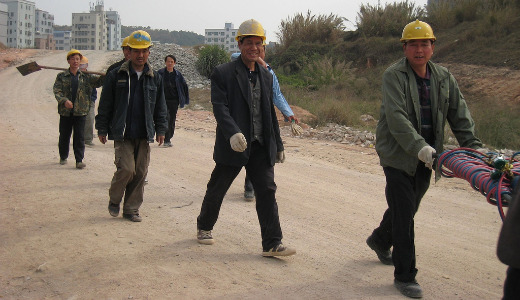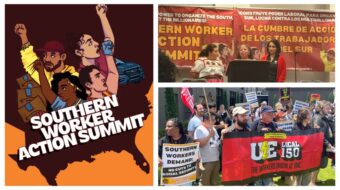
In the July 10, 2010, edition of the British magazine The Economist, there is an article about China’s banks, referred to as the “Great Wall Street.” The Economist is the British version of the Wall Street Journal. This article, with a little bit of attached explanation, I believe, can help my fellow workers understand why China-bashing in the labor movement is a bad idea.
Any sleazy politician or Wall Street banker knows the best way to take people’s minds off mistakes you have made is to focus their attention on somebody else. Problems with NAFTA and runaway corporate greed have given a lot of people associated with corporate America reason to point the finger at China as the culprit of America’s economic problems while dodging their own responsibility. Unfortunately some folks in labor, including in my own union, have fallen for this ploy. In my view, the corporate ruling class and their system of profits first, people last, is the enemy, not China.
My union, the International Association of Machinists, has a front-cover article in the summer 2010 edition of the IAM Journal on the TRADE Act, backed by the IAM, featuring a picture of Ohio Senator Sherrod Brown (Democrat), one of the co-sponsors of the bill.
The TRADE (Trade Reform, Accountability, Development and Employment) Act is supposed to fix the problems caused by NAFTA and other damaging trade agreements signed by the United States government. But the IAM Journal article says, on page 13: “A far more serious threat lies just across the Pacific, where the rules of trade are even more skewed, less enforced and government transparency is taboo. That menacing threat to fair globalization: China.”
The IAM Journal goes on to say: “The Economic Policy Institute estimates as many as 2.4 million U.S. jobs have been lost to China between 2001 and 2008 alone,” and “Experts say China has created an unfair trade advantage for themselves through the manipulation of its currency, cheap labor and government subsidies for its industries.”
The British Economist says, “While American and European banks have been busy blowing up, China’s have been transformed from communist bureaucracies crippled by bad debts into to something resembling world beaters.” The article goes on to say that China’s banks are government banks, and China did not suffer from the recent crisis because “they never entirely left the government’s embrace. So although they make money … the state owns a majority stake and the Communist Party appoints the top brass, whose pay is a fraction of that of their Western peers. Those bosses, with their dual role as party bigwigs and chief executives, are beholden to a higher authority than the stockmarket.”
The overwhelming evidence from all sources that are reliable is that the policy that China’s state banks follow that supersedes the stock market is that the banks’ job is to develop China in an all-around way and overcome the poverty of millions of Chinese people. In the last 30 years, since it changed course, away from the disastrous policies of the Cultural Revolution, and returned to its original platform of development and poverty-relief, China, according to the International Monetary Fund, has lifted more people out of poverty than at any other point in the history of the human race.
Corporate talking heads have claimed that this great economic development has only been possible because China embraced capitalism, but the Economist complains that China does not run according to the laws of the standard capitalist system. In fact, China has used market forces under government or socialist control to achieve this amazing economic miracle.
The Economist also says, “Rich countries tried to kick-start their economies by getting central banks to lend to banks, which, frustratingly, have hoarded the liquidity. As in 1999, after the Asian crisis, China’s politicians just cut out the middleman and told the banks to supply more credit … Even in rich countries with privately owned banks, supervisors are eyeing the tools used by China’s regulators to control credit. Communist Party diktat has been relabelled as ‘macroprudential supervision.'”
Many in the U.S. labor movement have seen China’s enormous stimulus package job creation through government-funded infrastructure programs as a model for what a U.S. job stimulus plan should look like. My union, the IAM, clearly calls for a national industrial policy and massive investment in infrastructure – surprisingly, just like our friends in China have actually done, not just talked about.
Solidarity between workers of all nations is the only way to get workers in the United States and elsewhere out of the massive economic crisis. Solidarity requires that we support efforts by workers in other countries who support policies that help workers rise up out of poverty. Despite many problems, most commentators agree the majority of Chinese workers support the policies of development, opening up to the outside world, and socialist control for the betterment of the nation, pursued by the Chinese government.
We cannot forget that it was U.S multinational corporations who chose to find and use the cheapest labor anywhere in the world they could find it. We cannot forget that China was a poor country when it opened up to direct foreign investment over 30 years ago. They use their poverty as an asset to develop the whole nation and have done quite well with this policy. Some poor countries using the capitalist model, rather than China’s market-socialist model, have enriched an elite and left their nation underdeveloped and their masses with no hope.
We must put issues such as China’s so-called “currency manipulation” in the context of government banks that put the nation’s development first, before the stock market.
China’s cautious monetary policy has actually been useful to the whole world, making China the rock in the global economy that can help the rest of the world climb out of this terrible recession. China is already out of the recession, so what about us?
Solidarity between workers, rather than competition, is our way out. We need a massive government investment in infrastructure to kick-start our economy, just like the Chinese are doing. Our enemy is not Chinese bankers that protected China from a banking crash, but the so-called deficit hawks who are crying on a false note that we must sacrifice Social Security and Medicare, and that we must not have another job-creating stimulus package or infrastructure investment.
It is not poor workers in Mexico who stole jobs from U.S. autoworkers. It is Ford, Chrysler and GM that sought out cheaper labor, obeying the dictates of the capitalist system. It is not Chinese economic policies that are the enemies of U.S. workers, but the corporate ruling class in the United States pursuing greedy policies that enrich themselves and bankrupt the U.S. working class. The Chinese government is pursuing policies that strengthen workers’ trade union organizations. We can unite with the workers in China who are organizing to fight for their rights. We can march with the AFL-CIO, SEIU, and the NAACP on October 2, 2010, for “Jobs, Justice, and Peace.”
And first and foremost, we can fight for a massive job-creating stimulus investment in our country’s infrastructure and defeat the ultra-right in this November’s election.
Photo: Workers in Shenzhen, Guangdong, China. http://www.flickr.com/photos/conbon/2253178883/ cc 2.0










